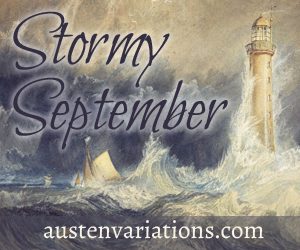 There is no question that weather was a significant factor in Regency era life. Snow, heavy rain, and other poor meteorological conditions would have made travel next to impossible and may have led to illness and even death. As such, it is not surprising that Jane Austen often referenced the elements in her novels.
There is no question that weather was a significant factor in Regency era life. Snow, heavy rain, and other poor meteorological conditions would have made travel next to impossible and may have led to illness and even death. As such, it is not surprising that Jane Austen often referenced the elements in her novels.
While Austen was certainly not the first author to use atmospheric conditions to set the tone for a story, she is one of the earliest to use weather as an actual plot device. In fact, weather in one form or another plays an important role in all of Austen’s work. According to John Mullan’s What Matters in Jane Austen?: Twenty Crucial Puzzles Solved: “Austen likes to make her plots turn on the weather. Having arranged her characters and defined their situations, having planned her love stories and hatched the misunderstandings that might impede them, she lets the weather shape events. It is her way of admitting chance into her narratives.”
Since we’re celebrating Stormy September here on the blog this month, I thought it might be interesting to take a look at how Austen uses rainstorms to shape the plot in two of her novels: Sense and Sensibility and Pride and Prejudice. In both of these stories, rain plays a pivotal role in bringing characters together—for better or worse.
According to Mullan, Sense and Sensibility is “kicked into life by a misjudgment about the weather” when Marianne Dashwood meets Mr. Willoughby while out walking with her sister Margaret.
The weather was not tempting enough to draw the two others from their pencil and their book, in spite of Marianne’s declaration that the day would be lastingly fair, and that every threatening cloud would be drawn off from their hills…
“Is there a felicity in the world,” said Marianne, “superior to this? — Margaret, we will walk here at least two hours.”
Margaret agreed, and they pursued their way against the wind, resisting it with laughing delight for about twenty minutes longer, when suddenly the clouds united over their heads, and a driving rain set full in their face. — Chagrined and surprised, they were obliged, though unwillingly, to turn back, for no shelter was nearer than their own house. One consolation however remained for them, to which the exigence of the moment gave more than usual propriety; it was that of running with all possible speed down the steep side of the hill which led immediately to their garden gate.
They set off. Marianne had at first the advantage, but a false step brought her suddenly to the ground; and Margaret, unable to stop herself to assist her, was involuntarily hurried along, and reached the bottom in safety.
A gentleman carrying a gun, with two pointers playing round him, was passing up the hill and within a few yards of Marianne, when her accident happened. He put down his gun and ran to her assistance. She had raised herself from the ground, but her foot had been twisted in her fall, and she was scarcely able to stand. The gentleman offered his services; and perceiving that her modesty declined what her situation rendered necessary, took her up in his arms without farther delay, and carried her down the hill. Then passing through the garden, the gate of which had been left open by Margaret, he bore her directly into the house, whither Margaret was just arrived, and quitted not his hold till he had seated her in a chair in the parlour. (Sense and Sensibility, Chapter 9)
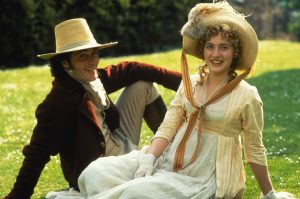
Courtesy Columbia Pictures
While Willoughby’s behavior seems, on the surface, to be all that is charming and gallant, there is definite foreshadowing at play here. Just as Marianne has misjudged the weather (declaring that the day would be “lastingly fair” despite the threatening clouds), so too does she delude herself about Willoughby’s true character.
In Pride and Prejudice rain also factors in a pivotal scene in the story. When Jane is invited to dine with Mr. Bingley’s sisters at Netherfield, she immediately applies to her mother for the carriage, but of course, Mrs. Bennet has other ideas.
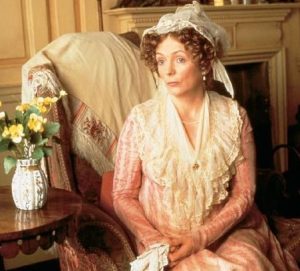
Courtesy BBC
“Can I have the carriage?” said Jane.
“No, my dear, you had better go on horseback, because it seems likely to rain; and then you must stay all night.”
“That would be a good scheme,” said Elizabeth, “if you were sure that they would not offer to send her home.”
“Oh! but the gentlemen will have Mr. Bingley’s chaise to go to Meryton, and the Hursts have no horses to theirs.”
“I had much rather go in the coach.”
“But, my dear, your father cannot spare the horses, I am sure. They are wanted in the farm, Mr. Bennet, are they not?”
“They are wanted in the farm much oftener than I can get them.”
“But if you have got them to-day,” said Elizabeth, “my mother’s purpose will be answered.”
She did at last extort from her father an acknowledgment that the horses were engaged. Jane was therefore obliged to go on horseback, and her mother attended her to the door with many cheerful prognostics of a bad day. Her hopes were answered; Jane had not been gone long before it rained hard. Her sisters were uneasy for her, but her mother was delighted. The rain continued the whole evening without intermission; Jane certainly could not come back.
“This was a lucky idea of mine, indeed!” said Mrs. Bennet more than once, as if the credit of making it rain were all her own. (Pride and Prejudice, Chapter 7)
As Mrs. Bennet intended, her daughter’s enforced stay at Netherfield helps to foster the growing attachment between Jane and Mr. Bingley, however, the rain also becomes a catalyst for Elizabeth’s relationship with Mr. Darcy. Being the devoted sister that she is, Elizabeth travels to Netherfield to nurse Jane, thereby placing herself under the same roof as Darcy. This throws the two characters together in a way that enables them to interact in a far more intimate environment, which sets the stage for the remainder of the story.
Even in film adaptations of Austen’s work, where some license is taken with the original story or setting, rain can be used to great effect in establishing the emotional tone for a scene.
Who can forget the iconic image of Colonel Brandon striding through the rain carrying a distraught Marianne in Ang Lee’s adaptation of Sense and Sensibility?
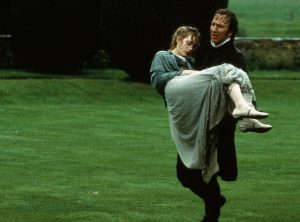
Courtesy Columbia Pictures
Or Mr. Darcy’s (literally) stormy proposal to Elizabeth Bennet in Joe Wright’s version of Pride and Prejudice?
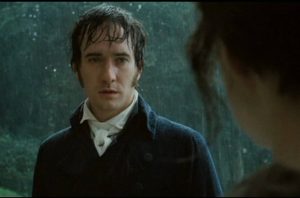
Courtesy of Working Title Films
Let’s face it, sometimes a little rain is just what’s needed to create a lasting impression!
What do you think? Can you come up with other examples of bad weather playing a part in Jane Austen’s novels? I’d love to hear your thoughts!
Until next time. 🙂

6 comments
Skip to comment form
The snow in Emma during Christmas Eve.
Author
Yes! Absolutely. And because of the snow, Emma is trapped with Mr. Elton. Ugh! 🙂
In ‘Persuasion’ the strength of the wind on the upper part of the Cobb forces the ladies to go down onto the lower part, which is how Louisa Musgrove falls. In ‘Mansfield Park’ Fanny has to shelter from a rain shower in the Parsonage, where a bored Mary Crawford takes a sudden interest in her.
Author
Great examples, Rita! Thanks for stopping by! 🙂
Austen mentioned weather a few times in her letters as well, in rather poetic terms. As a literary device, it worked well.
Author
Thanks for stopping by, Suzan! I’ve only read bits and pieces of Austen’s letters. Something I need to remedy in the near future. 🙂